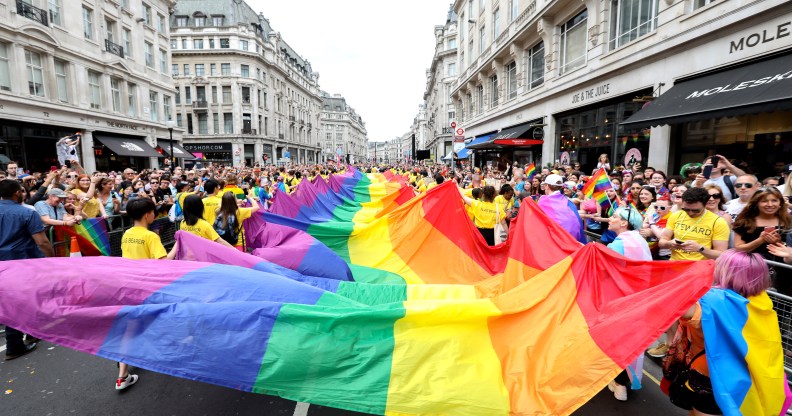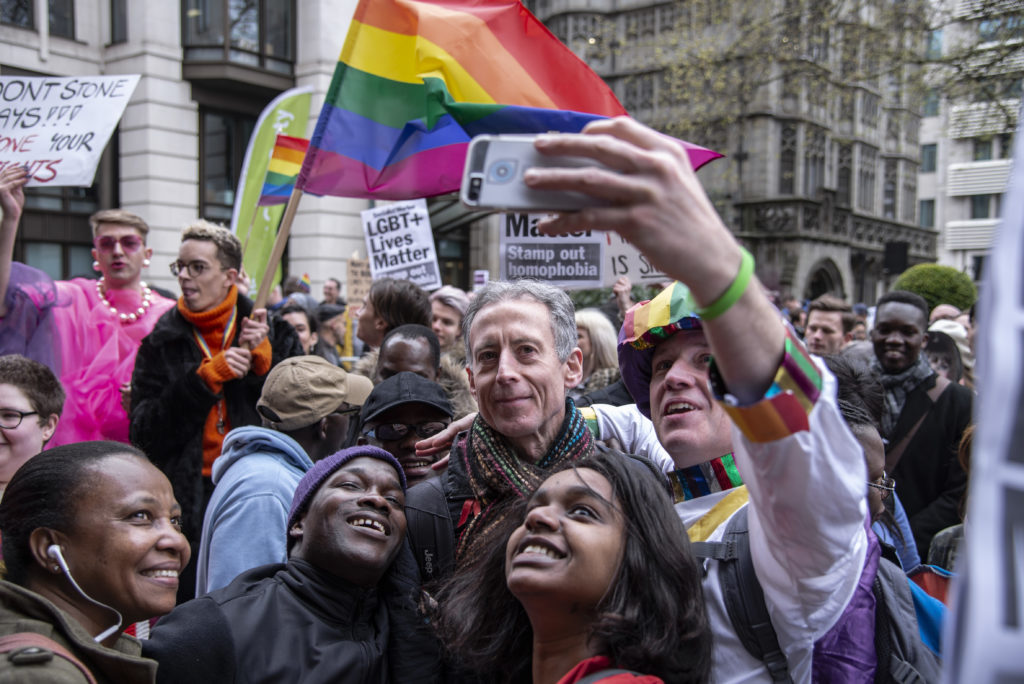Pride in London defend march over ‘pinkwashing’ claims

A general view of the parade during Pride in London 2019. (Tristan Fewings/Getty Images for Pride in London)
Pride in London organisers have defended the march after campaigners suggested it has become “bureaucratic and regimented,” and said there was a danger of “pinkwashing.”
As the Guardian reports, Peter Tatchell — LGBT+ activist and one of the organisers of the first UK Pride in 1972 — has criticised this year’s event for limiting the number of people marching.
“In the 1990s over 100,000 marched, and similar numbers would probably march today if the parade was not restricted, he said, adding, “Pride has become so bureaucratic and regimented.
“LGBT+ individuals cannot join the parade, only organisations.”
30,000 marches will join the parade in the UK capital today (Saturday July 6); up from 25,000 in 2018.
Pride has become so bureaucratic and regimented.

LGBTI rights campaigner Peter Tatchell has a selfie photograph taken with protesters. Demonstrators gather outside the Dorchester Hotel in Park Lane in London. (Claire Doherty/Getty Images)
Pride in London organisers said they had cut the number of wristbands given to corporate bodies to allow for more community groups to take part.
Tatchell also suggested that the cost of road closures, barricades, and parking suspensions around the parade had forced the event to rely too heavily on corporate sponsorship — a claim that organisers dispute.
He said that there was a danger of “pinkwashing,” explaining, “Some corporates seem to see pride as a marketing opportunity to target LGBT+ customers.”
Dan O’Gorman, Strategic Partnerships Director for Pride in London, told PinkNews: “With corporate pinkwashing an ongoing concern in the LGBT+ community, it’s vital that brands demonstrate and provide support all year round, and not just for one month a year.
“We always hold all brands and organisations to the highest standards when we work with them, making sure they actively contribute to improving the lives of our community in the capital and beyond.
“Organising Pride in London each year wouldn’t be possible without the support of our partners, who help keep Pride free for everyone to attend — and each and every one gets scrutinised by our Board of Directors as well as our Community Advisory Board to make sure they’re the right fit for us.
“We have an LGBT+ Ethical Policy to hold our partners accountable and to push to ensure their engagement is authentic. Partners and brands must not only stand with the community, but also challenge prejudice and fight for LGBT+ equality wherever they can, in all aspects of their business.”
As well as this, campaign group Lesbians and Gays Support the Migrants yesterday replaced bus stop adverts with political slogans along the Pride parade route.
This morning we joined forces with @LGBTIQoutside and hacked adverts at bus stop along the route of @PrideinLondon to highlight the people excluded from the march by excessive costs. #PrideIsAProtest #NoPrideInDeportations pic.twitter.com/ZEoPx2VChP
— Lesbians and Gays Support the Migrants (@lgsmigrants) July 5, 2019
The posters ask why the Home Office, the Metropolitan police and, corporations are able to participate in the parade while, “marginalised groups are left watching on the sidelines.”
PinkNews has approached Pride in London for further comment

